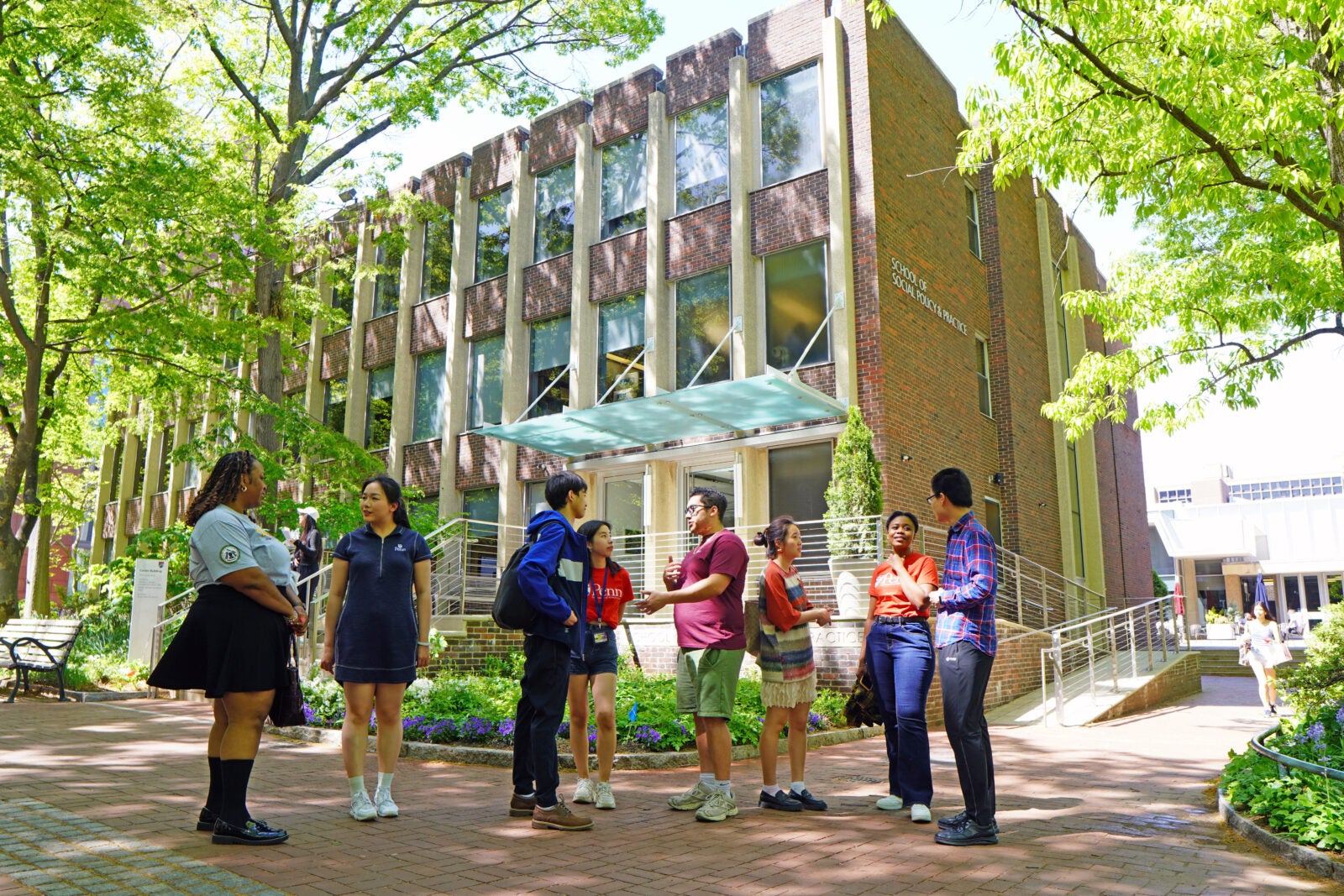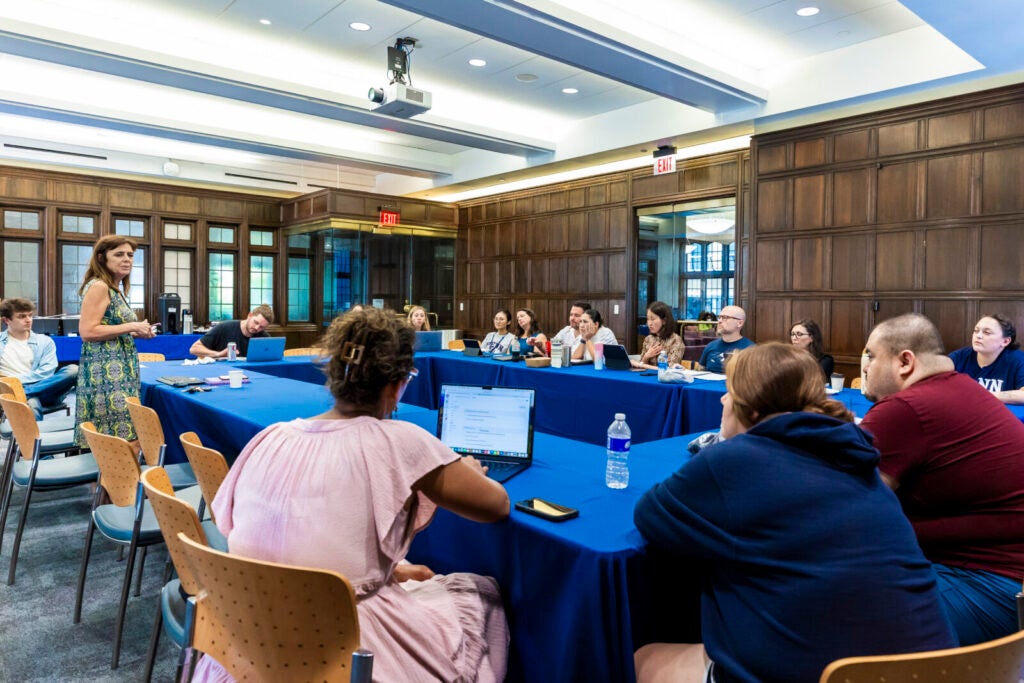
DOCTORATE INNONPROFIT ADMINISTRATION
STRENGTHEN YOUR LEADERSHIP TO SHAPE
THE FUTURE OF NONPROFITS – WITHOUT
INTERRUPTING YOUR CAREER
The Doctorate in Nonprofit Administration (DNPA) Program at the University of Pennsylvania School of Social Policy & Practice (SP2) equips nonprofit professionals with the knowledge and skills to translate research into practice, implement research informed strategies, manage projects, and further develop as leaders. The program nurtures the potential of nonprofit executives to drive meaningful changes both within their organizations and in the broader community, achieving positive outcomes at individual, organizational, and societal levels.
Request Info
Learn more about the Doctorate in Nonprofit Administration program and the SP2 experience.
Apply Now
Ready to experience SP2? Learn more about the application process.
Visit SP2
Join us for an upcoming in-person or virtual event.

Director’s Welcome
Ram A. Cnaan, PhD
Director, Doctorate in Nonprofit Administration
“The DNPA will challenge and inspire you, and my hope is that, three years from now, you will look back on it as a truly transformative experience that enriched both your leadership and our field.”
Flexible Hybrid Format
The Penn Doctorate in Nonprofit Administration (DNPA) program offers working professionals an Ivy League education—wherever they are. Each cohort, limited to approximately 20 students, advances through the program together from start to finish, fostering a close-knit learning community.
Courses are delivered through a blend of synchronous, real-time online interactive video sessions and periodic on-campus immersion experiences. In special cases, and if approved by the DNPA Faculty Director, students may take up to two courses at Penn outside the DNPA program to broaden their expertise.
The DNPA degree can be completed in as little as two years; however, most students finish in three years, with the third year typically devoted to dissertation research and writing.
The Campus Experience
Students begin the program with a five-day immersion experience on Penn’s Philadelphia campus at the start of their first semester (late August/early September). During this residency period, students attend their first classes and participate in a variety of activities that immerse them in the Penn experience and prepare them for what’s to come. During the fall of year two, students return to campus for an additional four-day residency. Students able to visit campus more frequently are invited to use our library, meet with faculty, and take advantage of Penn’s other campus resources and activities.

The Classroom Experience
Classes meet online two evenings per week for two hours. Students and faculty log in on their personal computers or devices from wherever they are. Real-time video conferencing allows everyone to be seen and always heard, closely approximating a physical classroom experience. Students are in class for the first two years of the program; in the third year, students participate in a Dissertation Seminar Series that provides support and structure as they complete the last stages of the dissertation.
The SP2 Difference

The nation’s first doctorate dedicated to the study of nonprofit administration
A hybrid format designed for busy working professionals
Courses taught by Penn’s world-class standing faculty as well as by CEO’s who are practicing in the field, to provide multiple perspectives on the challenges facing the nonprofit sector
The opportunity to conduct dissertation research
A diverse global alumni network from the SP2 and Penn community
Curriculum
The Doctorate in Nonprofit Administration (DNPA) provides advanced education for nonprofit professionals seeking to deepen their theoretical understanding and enhance their capacity for effective leadership. The program integrates conceptual frameworks, applied research, and leadership development to enable students to translate empirical findings into effective organizational and community programs. Through its interdisciplinary curriculum, the DNPA emphasizes strategic management, program evaluation, and the application of scholarly inquiry to complex challenges in the nonprofit sector.
The program is designed to strengthen the professional competencies of nonprofit executives and senior practitioners who aspire to lead systemic and sustainable change. Graduates are prepared to address multifaceted social issues, foster organizational learning, and contribute to the advancement of the field through both practice and scholarship. Developed by the School of Social Policy & Practice, the DNPA cultivates leaders capable of making significant contributions to the governance, innovation, and ethical stewardship of nonprofit organizations operating within an increasingly complex and dynamic environment.
First Year
The program begins with an in-person immersion, during which students engage with their peers and faculty, become familiar with the campus, and commence their coursework. The first year of study provides a rigorous foundation in advanced nonprofit concepts and organizational theory, along with essential training in both quantitative and qualitative research methods.
In addition to the core theoretical and methodological courses, first-year students complete two skill-based courses—“Leading and Driving Change in Nonprofit Organizations” and “Philanthropy and Fundraising”—that emphasize applied leadership and resource development within the nonprofit context.
During the summer terms, students enroll in two additional courses (one in Summer I and one in Summer II). The proposed sequence of courses is detailed in the following section. In addition, students will participate in a biweekly seminar that provides foundational guidance in dissertation research and scholarly writing.
Fall
- On Campus Immersion
- Biweekly Dissertation Seminar
- NPLD 9001 Theory and Concepts of the Nonprofit Sector (1 CU)
- NPLD 9012 Leading and Driving Change in Nonprofit Organizations (1 CU)
Spring
- NPLD 9002 Advanced Organizational Behavior in Nonprofit Leadership (1 CU)
- NPLD 9003 Methods of Inquiry: Quantitative Research Methods (1 CU)
Summer
- Biweekly Dissertation Seminar
- NPLD 9004 Methods of Inquiry: Qualitative Research Methods (1 CU)
- NPLD 9005 Philanthropy and Fundraising (1 CU)
Second Year
In the second year, the curriculum advances to a series of specialized, applied courses that address critical dimensions of nonprofit administration. These courses deepen students’ understanding of advanced leadership and management practices while emphasizing the importance of cultural diversity and inclusivity in organizational contexts. The coursework includes topics such as “Ethics and Legal Issues in Nonprofit Administration,” “Social Entrepreneurship and Innovation,” “Financial Management and Sustainability in Nonprofits,” “Applied Statistics,” and “Global Philanthropy and the Role of International NGOs.”
By the conclusion of the second year, students will have completed the twelve course credits required as a prerequisite for defending the dissertation proposal. During this period, and with the guidance of the program director, each student will also identify and secure a dissertation chair to support the development of their research project.
Fall
- NPLD 9006 Applied Statistics (1 CU)
- NPLD 9007 Financial Management and Sustainability in Nonprofits (1 CU)
Spring
- NPLD 9008 Principles of Leadership: Including Strategic Leadership (1 CU)
- NPLD 9009 Social Entrepreneurship and Innovation (1 CU)
Summer
- NPLD 9010 Ethics and Legal Issues in Nonprofit Administration (1 CU)
- NPLD 9011 Global Philanthropy and the Role of International NGOs (1 CU)
Third Year
In the third year, students devote their time primarily to the development and completion of their dissertations, working closely under the supervision of their dissertation chair. The dissertation represents the culminating scholarly component of the DNPA program and must be a data-driven study that contributes to advancing knowledge and practice in the field of nonprofit administration. Projects are expected to demonstrate methodological rigor, theoretical grounding, and practical relevance, with the potential for dissemination through professional or academic channels.
To support this process, students participate in a year-long, non-credit dissertation workshop that convenes monthly. This seminar provides structured guidance on research design, data analysis, and academic writing while fostering peer exchange and scholarly collaboration. It also functions as an ongoing forum for progress review, feedback, and problem-solving, helping students navigate challenges and sustain momentum toward the successful defense of their dissertations.
Fall
- NPLD 9900 DNPA Dissertation (0 CU)
Spring
- NPLD 9900 DNPA Dissertation (0 CU)
The course sequence may change but the format will not.
World-Class Faculty
Doctorate in Nonprofit Administration program faculty are here to help you shape your specific area of expertise, drawing on their own decades of scholarship, teaching, and industry experience. Our DNPA Faculty includes:

The Dissertation
The Process
The DNPA dissertation is a cornerstone of the program, designed to advance scholarly understanding of the nonprofit sector. In the first year, students meet bi-weekly with a designated professor to explore potential research topics and gain a clear understanding of the dissertation process. Following this initial phase, each student is matched with a mentor who will serve as their dissertation chair.
Through close mentorship and a structured research plan, students produce an original work of scholarship that makes a meaningful contribution to the literature and knowledge base in nonprofit studies. This rigorous process engages students in in-depth inquiry and positions them as subject-matter experts in their chosen area.
The Method
Students have flexibility in selecting the research approach best suited to their questions. Options include systematic or scoping reviews, quantitative designs (such as intervention studies and surveys), qualitative studies, and program evaluations. Detailed guidelines are available in the DNPA Handbook.
The Finished Product
The completed dissertation may take the form of a traditional, multi-chapter manuscript or two publishable articles. All DNPA dissertations are published in Scholarly Commons, the University of Pennsylvania’s open-access repository, ensuring that the knowledge generated is accessible to nonprofit practitioners and scholars worldwide. While not mandatory, students are strongly encouraged to submit their work to leading academic journals focused on the nonprofit sector, further extending the impact of their research.

Ready to join the DNPA community?
The DNPA degree program is offered by the University of Pennsylvania, an institution of higher education authorized to confer degrees and certificates conferring academic credit under applicable laws of the United States. Students who are interested in participating in the program from countries other than the United States are advised that each jurisdiction may have its own laws and regulations governing online educational programs, and some jurisdictions may not recognize course credit or an online degree awarded by the University as satisfying local requirements for professional licensure, employment qualification, or other purposes. Before enrolling in this program, prospective students should investigate their jurisdiction’s treatment of foreign online programs to ensure that participation in this program will meet their objectives.
Due to visa sponsorship limitations for the required in-person immersion component, the program is not open to international students at this time.
Contact Us
Nicole Auge, MS
Director of Instructional Design and Educational Technology
DNPAContact@sp2.upenn.edu